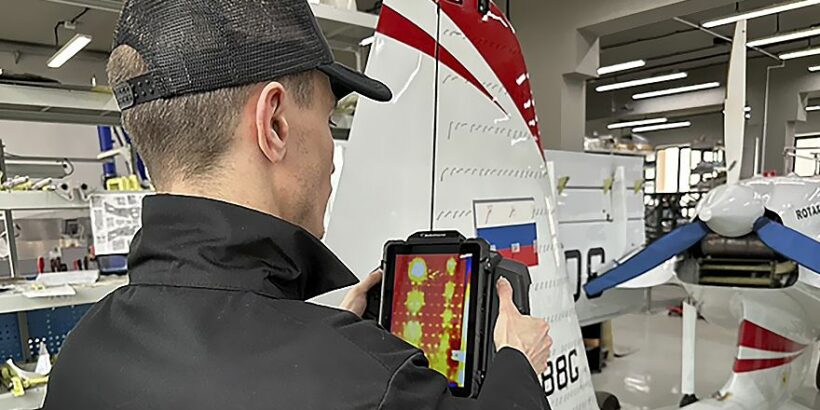Composite elements can be damaged both in production and during operation as part of an aircraft, and water accumulations in honeycomb structures at altitude can turn into ice and destroy airliner parts. In order to avoid aviation accidents with aircrafts whose fuselage, wing and plumage are made of polymer composite materials (PCM), it is necessary to assess their condition timely and correctly.
The Central Aerohydrodynamic Institute (TsAGI) together with the specialists of the Soluterm technology startup have developed a set of technologies designed to detect defects and damages of aircraft structures made of PCM. The innovative products of the complex consist of an impact-sensitive coating for aircraft cladding, a laser ultrasonic flaw detector-depth meter and the Solirt Pro hardware and software system.
Atmosphere-resistant impact-sensitive coating of airframe cladding, designed to detect impact locations, is thermally stable in the temperature range from -60°C to +100°C, resistant to mould fungi, mineral oils and organic solvents. TsAGI expects to complete its certification in the near future.
The laser ultrasonic flaw detector-depth gauge is capable of determining with high accuracy the depth and dimensions of low-visibility impact damage of composite aggregates and assessing the internal damage of the material. At the present time a working mock-up of the device has been created.
The Solirt Pro infrared thermography hardware and software system allows to detect hidden production and operational defects in composite cladding of aircraft fuselage and wing by means of thermal inspection. In 2023, the first pre-production model of the complex was manufactured, and now its testing and fine-tuning are underway.
Soluterm started working on the development of non-destructive testing methods in 2014. At present, it is a subsidiary of the Institute, responsible for bringing technologies to a serial product, and a resident of TsAGI Technopark. Until a few years ago, Solirt Pro was created with the participation of Airbus Innovations. After the introduction of anti-Russian sanctions and Airbus withdrawal from the Russian market, TsAGI and Soluterm continued to develop this technology independently.
A new strategic partner of TsAGI, Scientific-Engineering Company, which has many years of experience in co-operation with Boeing, joined the Soluterm project. Thus, the competences of domestic research centres, new engineering approaches of leading manufacturing enterprises and understanding of the best Western practices were combined to form a scientific and technical foundation for innovative developments. At the new stage of research of non-destructive testing of composite structures the specialists of the partner companies develop a line of automated hardware-software complexes for thermographic active flaw detection of PCM on the basis of neural networks.
The Institute and Soluterm are planning to use non-destructive testing technologies for unmanned aviation. In 2024-2025, a new version of a ground-based measuring and computing complex will be created to detect faults and defects in composite structures of manned and unmanned aircraft. It is expected that part of the project will be implemented on the site of TsAGI Technopark specialising in high technologies.


